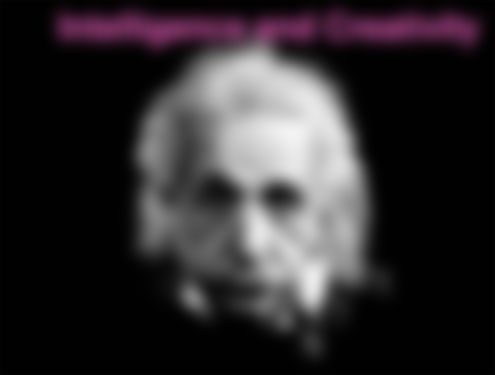Creativity and Intelligence
The following questions have always been asked or are being asked: What is the particular relation of creativity to intelligence? Can one be creative without having intelligence? Can the person demonstrate a high level of intelligence that has nothing to do with creativity? More importantly, can creativity and intelligence be valued without someone? When one encounters new information, is it intelligently or creatively captured and analyzed?

Intelligence and creativity have always been considered separate behaviors, especially when it comes to artistic creation. The sentence “Even if a person does not have high intelligence, he has special talents” indicates that verbal or non-numerical mental characteristics are defined as “talent” lower than intelligence.
Some psychologists have defined intelligence as the ability to "think abstractly, establish relationships between events, and criticize oneself". Another part considered intelligence as the ability to “adjust to the environment and new situations”. Still others define intelligence as "the ability to learn"
Some of the scientists have also made definitions that emphasize a certain aspect of intelligence according to their fields of expertise. For example, biologists see intelligence as "the ability to adapt to the environment", educators see it as "learning", psychologists as "understanding relationships" and computer scientists as "the ability to process information".
It is generally accepted that intelligence is biologically based and how much of this capacity can be achieved with the influence of environmental factors such as mental stimulation, especially at early ages, but the interaction mechanisms are not yet fully understood.
There are many psychologists who argue that the concept of creativity is related to intelligence. While creative behavior is expected from those with a high intelligence quotient (IQ), it is not thought that such a talent can exist in those with a low intelligence quotient. There is no doubt that there are significant links between IQ, a measure of an intelligence test, and some creative skills, but this link is not fully known. As reported by Yavuz (1996), although the sources showing these connections are seen in the studies of Terman et al. (Terman and Cox, 1926), a definite conclusion could not be reached. According to Uzunçarşılı (1994), when the measured IQ exceeds 120, it does not bring any privilege for creativity.
The importance of the relationship between creativity and intelligence has been recognized by psychologists from various perspectives (Catell, 1963; Coler, 1963; Guilford, 1950, 1959, 1968, 1981; MacKinnon, 1962; Roe, 1951, 1963; Terman, 1954, 1955; Torrance, 1960, 1967). From genetics to engineering, scientists working in various other branches of science also include the help of intelligence in creative discoveries and inventions; Philosophers from Aristotle and Plato to Immanuel Kant, Brand Blanshard and Jacques Maritain have considered the origin of creativity and its relation to rational thought (HAENSLY and REYNOLDS, 1989).
As a result of the researches carried out to search for the existence of a certain relationship between creativity and intelligence, direct and definite correlations could not be reached. It was seen in these studies that some students who were successful in exams and highly intelligent in intelligence tests could not put forward original and new ideas in various fields (SAN, 1985). Findings related to the personalities and school achievements of children with different levels of creativity reveal that there may be differences between children's IQs, but that creativity cannot be understood from these, and that this ability can be understood with some clearly visible characteristics, the difference between very high creativity and "being a little bit creative" (JERSILD, 1972).
In line with Guilford's studies in the field of scientific creativity, he says that creativity is included in the general state of intelligence. According to him, in this situation in which five mental processes such as cognitive thinking, memory, divergent thinking, convergent thinking and critical thinking take place, the divergent thinking factor is the closest to creativity (KIRIŞOĞLU, 1991).
Divergent thinking is remembering possible solutions or generating new ones; one's thoughts "diverge" (expand) along many different paths. Convergent thinking, on the other hand, is defined as applying knowledge and logic rules in order to narrow the possibilities and “converge” to the most appropriate solution.Divergent thinking is more flexible than convergent thinking; it is a method of thinking that is not satisfied with the information at hand; it is open to a richer flow of ideas and therefore more prone to new solutions and creativity (JERSILD, 1972).
Researchers state that a high level of intelligence does not guarantee a high level of creativity, there is not a very high correlation between creativity and intelligence, and a more intelligent person does not mean a more creative person. According to Guilford, “intelligence has never been the sole determining variable in creativity. Intelligence, whose multidimensionality was revealed by factor analysis, could not explain creativity by itself. Moreover, a variable that could emerge as a sub-component of intelligence could also appear as a sub-component of creativity” .The realization of creative potentials usually requires at least a slightly above-average intelligence level.
